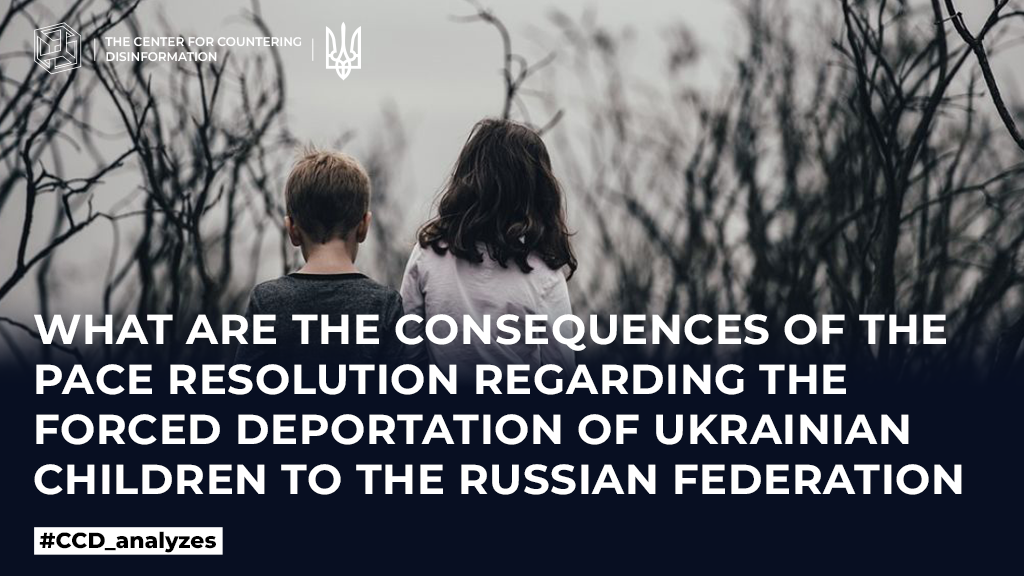At the spring session, the Parliamentary Assembly of the Council of Europe (PACE) adopted a resolution dated April 27 regarding the forced deportation of Ukrainian children and adults to the territory of russia, recognizing such actions as genocide. The document was supported by 87 parliamentarians out of 89 present. The resolution states that the russian aggressors must immediately stop the illegal forced transfer and deportation of Ukrainian children, as well as stop granting them russian citizenship. The PACE calls on the russian authorities to immediately allow representatives of the UN and the International Committee of the Red Cross to visit the already displaced children and guarantee their safe return.
❗️The resolution emphasizes that “documented facts of deportation and forcible transfer of Ukrainian children” are subject to the Genocide Convention of 1948, Article 2 of which defines that the forcible transfer of children with the intent to destroy, in whole or in part, a national, ethnic, racial or religious group is considered the crime of genocide”. The resolution names the unrecognized president of Belarus o.lukashenko, the prime minister of the russian federation, the ministers of education and health, the commissioner for human rights, and the first deputy chief of staff of the president of russia, at the regional level – the governors of the krasnodar, magadan, kamchatka regions, the heads of tatarstan and the republic of adygea. As of the end of March, the Ukrainian authorities know for sure about more than 19.5 thousand children taken from the TOT to russia, of which a little more than 300 have been returned home so far.
The reaction of Ukraine and the world community was stormy.
In the video message, the President of Ukraine V. Zelenskyy noted that the PACE resolution is evidence that the russian federation will not avoid responsibility for its crimes against Ukraine and the Ukrainian people.
A member of the Ukrainian delegation to PACE, O. Honcharenko, identified the most important thing in the resolution as the fact that the term “genocide” is mentioned for the first time in an official document of this level regarding the actions of the russian federation.
The Commissioner for Human Rights of the Verkhovna Rada of Ukraine, D. Lubinets, expressed the hope that this document “will help in returning our children to the Motherland, and will also be used in international courts to hold russia accountable for the genocide of the Ukrainian nation.”
The upper house of the French parliament adopted a resolution condemning the deportation of Ukrainian children from the russian federation and the actions of the russian regime and called on EU institutions and countries to impose sanctions on russian officials involved in these crimes.
The Senate of Poland adopted a resolution condemning the illegal deportation of Ukrainian children to the territory of the russian federation.
To justify putin, the russian federation tried to use its presidency of the UN Security Council to organize a meeting of the Security Council regarding the alleged legal grounds for the abduction of Ukrainian children, but 49 countries of the world in a joint statement condemned russia for such a provocation.
What are the legal and political consequences of this decision for the russian federation, Ukraine, and the world?
It is worth noting that the PACE resolution contains “soft law” norms, which are not binding, but it is an important political result from the point of view of the legal prospects of punishing the russian federation for its crimes in Ukraine.
Firstly, the resolution became a logical confirmation of the decision of the International Criminal Court on March 17 regarding the arrest warrant for the president of russia and his commissioner for children’s rights. The unity of parliamentarians of European countries during the voting and adoption of this historic resolution testifies to the mood of the European community and decisive readiness to condemn russia and putin personally and expands the circle of countries where he is officially considered a suspect in war crimes.
Secondly, recognition of the fact of genocide at the level of an international organization that unites 46 countries will help bring the perpetrators, in particular, putin, to actual responsibility. After all, the jurisdiction of the International Criminal Court extends to this type of crime. If the ICC reclassifies the introduced case against putin from a crime against humanity (deportation or forcible transfer of persons) to a crime of genocide, it will make it possible to bring him to real, not hypothetical, responsibility. Also, the decision of the Assembly to create a register of the consequences of the deportation of children can become an additional source of evidence for the implementation of international criminal justice.
Thirdly, the PACE resolution in a certain way overrules russia’s propaganda narrative that the purpose of the deportation was to “save” the children.
And most importantly, the trend of spreading international condemnation of putin and his supporters creates conditions for the destruction of the mechanism of abduction of Ukrainian children specially created by russia, aimed at destroying their Ukrainian identity, and the development of an effective algorithm for finding and returning them home.










